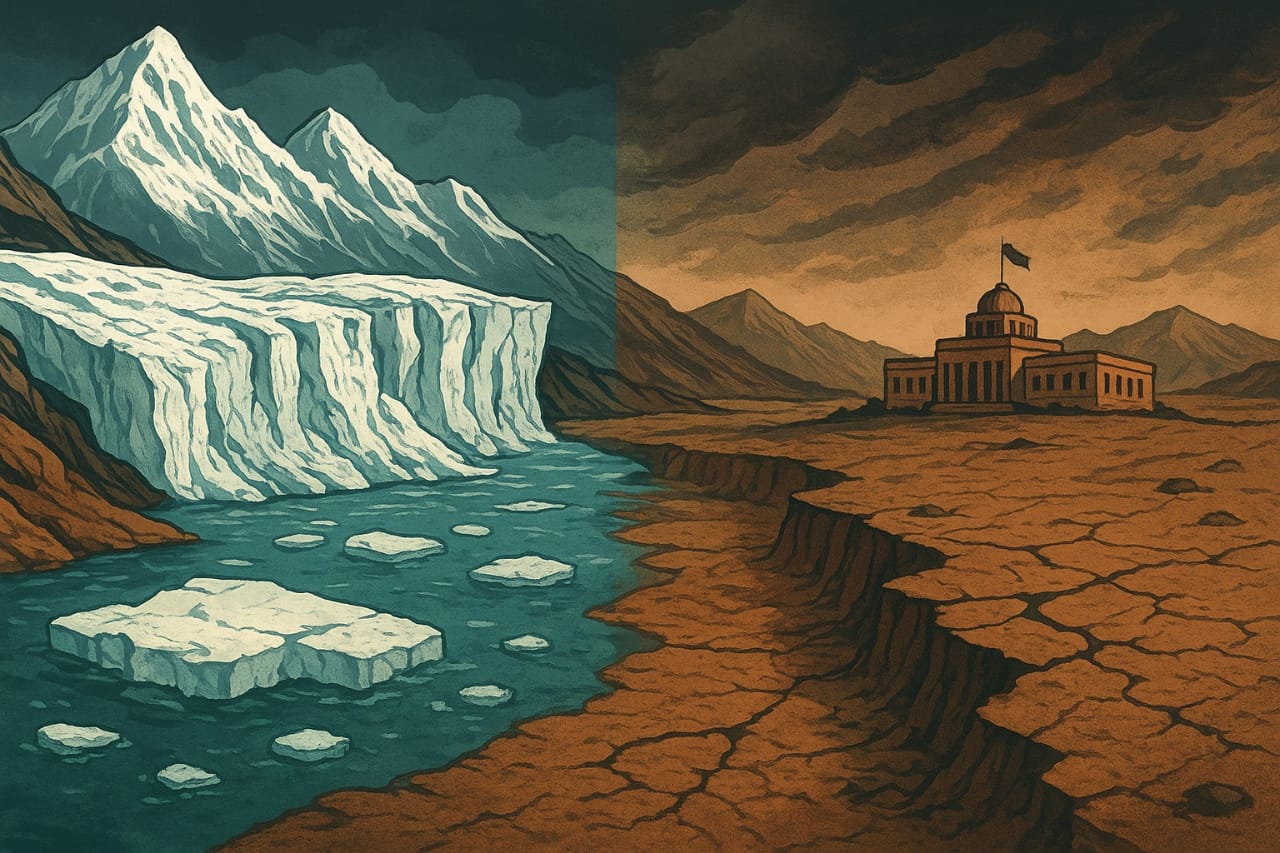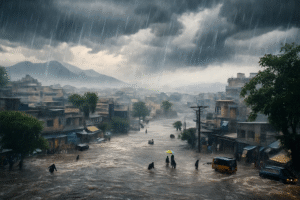Between Melting Glacier`s and Political Negligence: Climate Change`s Alarming Impact on Gilgit Baltistan

Between Melting Glacier`s and Political Negligence: Climate Change`s Alarming Impact on Gilgit Baltistan
Climate change has become a global crisis, but Gilgit Baltistan is among the most vulnerable regions despite contributing almost nothing to global emissions. Climate change has become an active threat to the communities of Gilgit Baltistan. The region, once known for its unparalleled beauty, green lush valleys and snow-cupped mountains, is now on the verge of chaos due to unprecedented environmental, social and economic challenges. From rapidly melting glaciers to frequent floods, the people of Gilgit Baltistan are on the frontline of a crisis that not only threatens their livelihoods but also shattered the socio-economic domain. Gilgit Baltistan long romanticized as Pakistan`s ‘crown’, today stands fractured under the dual weight of environmental catastrophe and political negligence.
One of the most important impacts of climate change on the region is glacier melting. There are around 7000 glaciers in the region which are melting at a very high speed. These melted glaciers formed lakes, which are at high risk of bursting, leading to destructive floods. Gilgit Baltistan has already faced these destructions in the past. According to recent data, 120 floods have hit the region in 2025 alone, causing 46 deaths, 47 injured and also there are hundreds of families struggling with mental health crisis. Along-with destruction of infrastructure, livelihoods and displacing communities, the disaster reveals that climate change is not just an environmental issue, but a humanitarian and developmental crisis as well.
Another alarming situation is the pattern of erratic weather conditions. Most of the agricultural system of Gilgit Baltistan is heavily dependent on the natural process of glacier melting that irrigated the whole lands of the region, but now due to the unpredictable weather pattern and sudden outbursts, locals are facing drought-like conditions in some areas while on the other side severe flash floods destroy all the standing crops. This inconsistent pattern undermines food security that pushes rural families into the threat of poverty and forced migration. In the region where agriculture and tourism are the backbone of the economy, the consequences of floods are devastating. The heavily dependent tourism economy has collapsed.
Tourism, one of the main economic revival of the region, is now facing severe impacts of climate change. The floods have cut off the major transport routes that connect the region to the rest of the country. Hotels are destroyed and that created a sense of insecurity in visitors. The recent floods have impacted the economy of the region very badly, families who once relied on seasonal tourism now face economic ruin, and the silence from those in power only deepens the wound. Amid all these, the government has failed to provide effective safeguards for the local economy.
Instead of focusing on long-term solutions, authorities take reactive measures for compensation only. This negligence further enhances the suffering of people who feel marginalized both economically and politically as well. Silence of leaders on such disasters and climatic change in the region is deeply concerning, while every year, communities are forced to rebuild their lives from scratches, paying the price for sins they never committed. Despite its major importance, being home to the largest reserves of fresh water, the region does not receive the attention it deserves both socially and constitutionally.
Environmental catastrophe is not the only problem of the region, political instability is another challenge of the region, the ongoing natural disasters, also coupled with widespread protests and sit-ins led by civil society, have placed the region in a state of constant uncertainty. What should have been a time of collective healing has instead become a painful reminder of how fragile both our environment and institutions have become. Shifting the region`s fate in the name of climate change without addressing systematic failure is nothing more than a temporary fix. The mountains need justice, not rhetoric. The people of Gilgit Baltistan demand dignity, the dignity against systematic neglect, ecological exploitation, and political victimization.
But it is not the end at all. There are key points to track the development in the climate and human rights field in the region in order to transform Gilgit Baltistan into a model of climate resilience. This requires keeping track of evolving climate-related laws and policies, while adopting a bottom-up approach that engages local communities in decision making processes. Collaboration with different national and international non-governmental organizations is also essential, as they can provide both technical and financial support. Furthermore, community led institutions and sustainable tourism can play a pivotal role in creating resilient livelihoods and reducing vulnerabilities.
Efforts at grass-root levels, supported by strong institutional backing, are necessary to build resilience against climate shocks such as rising temperatures, glaciers melting and erratic weather patterns. Ultimately, this is not merely about tackling environmental challenges, but about ensuring justice, dignity and survival of local communities whose right to live in security and prosperity must be protected. To achieve this, federal government alongside provincial authorities, must prioritize climate adaptations in Gilgit Baltistan by strengthening disaster management system, developing resilient infrastructure, and ensuring advance preparedness.
In conclusion, climate change in Gilgit Baltistan is both a warning and a call to action. Addressing it with urgency, sincerity and inclusivity can turn GB from a victim of Climate Change into a beacon of resilience. The choice lies with policy makers, but the time to act is now. Above all, safeguarding the rights, security and livelihoods of the people must remain central. If taken seriously, the fight against climate change in Gilgit Baltistan can not only protect its mountains and valleys but also offers lessons of resilience and justice for the rest of the world.



